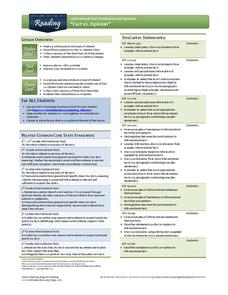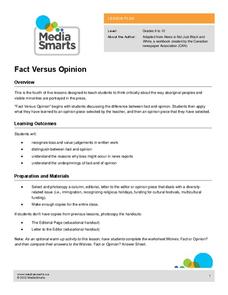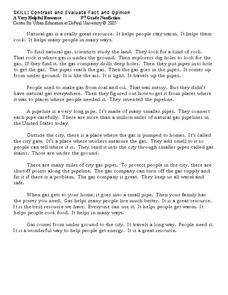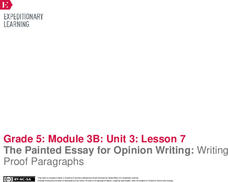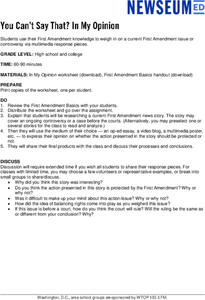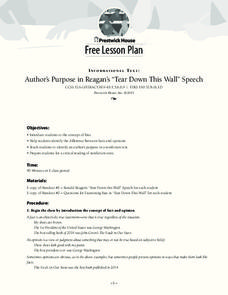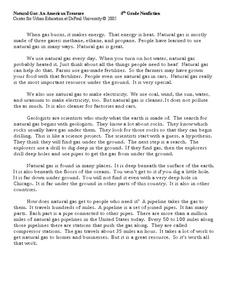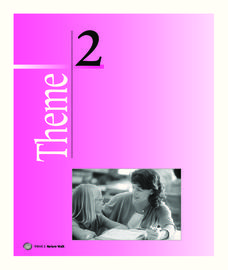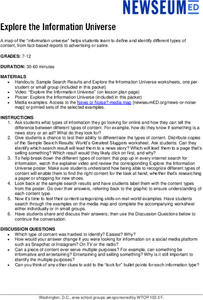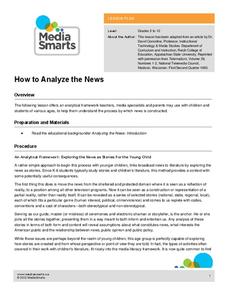The New York Times
News and News Analysis: Navigating Fact and Opinion in the Times
Help your class understand the difference between fact and opinion by exploring the New York Times homepage and articles. In pairs or small groups, pupils complete a scavenger hunt, answering the provided questions. Next, discuss the...
For the Teachers
Fact vs. Opinion
Many informational texts are written as factual, but can your learners determine when an opinion is presented as fact? Have your kids read several articles on the same topic and record the statements that contain either facts or...
Media Smarts
Fact versus Opinion
Part of a series aimed at breaking down cultural bias from the Canadian Media Awareness Network, this activity identifies where opinions do and don't belong in a newspaper. Pupils review handouts about the purpose of editorial comments...
PBS
Facts vs. Opinions vs. Informed Opinions and their Role in Journalism
Do reporters write about what they see, or what they think? Examine the differences between investigative writing and opinion writing with a lesson from PBS. Learners look over different examples of each kind of reporting, and convince...
Curated OER
Build Mastery: Fact and Opinion
Is it a fact or an opinion? Get your kids up and moving during this reading comprehension activity. They listen to you read a book or passage (consider writing something yourself to get the ideal text), listening for facts and opinions....
University of the Desert
Fact and Opinion within the Media
How can the media foster cultural misunderstandings? These activities encourage learners to distinguish between fact and opinion in the media
DePaul University
Contrast and Evaluate Fact and Opinion
Looking for a resource that helps learners practice identifying fact and opinion? A four-page worksheet includes two informational text reading passages. Pupils read each passage and respond to four multiple choice and one short answer...
EngageNY
The Painted Essay for Opinion Writing: Writing Proof Paragraphs
It's time to proof read! Pupils read and analyze proof paragraphs from a model essay. They then practice writing their own proof paragraphs to express an opinion about offshore oil drilling.
EngageNY
Identifying Author’s Opinion and Evidence: The Value of Sports in People’s Lives, Part II
Context matters! Using the intuitive resource, pupils decipher context clues to determine the meaning of unknown words from an informational text. Also, in small groups, they practice identifying the author's opinion and supporting...
EngageNY
Final Performance Task: Delivering an Opinion Speech with Multimedia Display
Welcome to the grand finale! Scholars practice reading their speeches to a partner and make last-minute changes based on feedback. Pupils then present their final opinion speeches to their small groups and show off their work in a...
Newseum
You Can’t Say That: In My Opinion
As a part of a study of the First Amendment, high schoolers research a current news story that seems to involve one of the freedoms granted by the First Amendment. Investigators decide whether they think the action presented in the story...
EngageNY
Identifying Author’s Opinion and Evidence: The Value of Sports in People’s Lives, Part I
Just like instant replay, it's time to take a closer look! Pupils work together to add ideas to a Close Readers Do These Things anchor chart. They then put their knowledge to the test as they read an informational article about the...
Curated OER
Scapegoating and Othering
Scapegoating and "Othering" is the focus of a series of activities that ask groups to consider how these behaviors contribute to hatred and intolerance. Groups are given a scenario and discussion questions based on the situation. Whether...
The New York Times
Evaluating Sources in a ‘Post-Truth’ World: Ideas for Teaching and Learning about Fake News
The framers of the United States Constitution felt a free press was so essential to a democracy that they granted the press the protection it needed to hold the powerful to account in the First Amendment. Today, digital natives need to...
Curated OER
Writing a News Article
Join the newspaper business with a series of lessons and exercises focused on elements of journalism. The packet focuses on distinguishing fact from opinion, writing effective headlines, sequencing events, and editing and proofreading a...
Prestwick House
Author’s Purpose in Reagan’s “Tear Down This Wall” Speech
President Ronald Reagan's "Tear Down This Wall" speech, delivered on June 12, 1987 before the Berlin Wall, provides class members with an opportunity to examine three key aspects of informational text: author bias, the use of facts and...
Curated OER
Natural Gas: An American Treasure
Do your fourth graders need extra practice with evaluating fact and opinion? An informative resource provides two reading passages in which learners distinguish sentences as fact or as opinion. Additionally, they determine how the...
Newseum
Weighing the Arguments
To understand how personal perspectives can affect policy and politics, scholars examine the woman suffrage media map and historical artifacts to analyze arguments for and against women's suffrage. Class members then take on the role of...
Houghton Mifflin Harcourt
Nature Walk: Extra Support Lessons (Theme 2)
Reinforce concepts such as long vowels, spelling patterns, sound clusters, double-final consonants, and syllables with a nature-themed unit. Through a series of extra support lessons, learners compare and contrast using a Venn diagram,...
State Bar of Texas
Engel v. Vitale
Can you bow your head and pray in school? Scholars investigate the issue of school prayer with the Supreme Court case Engel v. Vitale. A short video clip along with paired group work helps viewers form opinions on the matter. They answer...
Newseum
Fake News Through History: Analyzing Historical Sources
Unfortunately, fake news, fuzzy facts, and bogus news stories are not new phenomena. Class members use a "Fake News Through History" worksheet to analyze historical examples of false, invented, made-up news. Researchers share their...
Newseum
Explore the Information Universe
Distinguishing among different types of content when conducting online searches can be a challenge. An informative resource helps researchers identify different types of content, from fact-based reports to ads, from propaganda to satire....
Media Smarts
How to Analyze the News
Teach kids how to watch television, specifically the news, with this creative idea for learners of all ages from the Media Awareness Network. The elementary school plan focuses on presenting news as a story and uses Jon Scieszka's story...
Curated OER
Farming: It's a Fact
What does it take to work in agribusiness? Conduct and explorative investigation which describes where our food dollars go, who makes money on what we buy, and jobs related to agriculture. The class plays an interactive game, analyzes a...
Other popular searches
- Fact Opinion Lesson Plans
- Fact and Opinion Passages
- Fact Opinion Worksheet
- Fact and Opinion Lessons
- Teaching Fact vs. Opinion
- Fact and Opinion Worksheets
- Teaching Fact and Opinion
- Fact and Opinion Games
- Reading Fact and Opinion
- Fact and Opinion Keywords
- Identifying Fact or Opinion
- Fact Opinion Quiz



